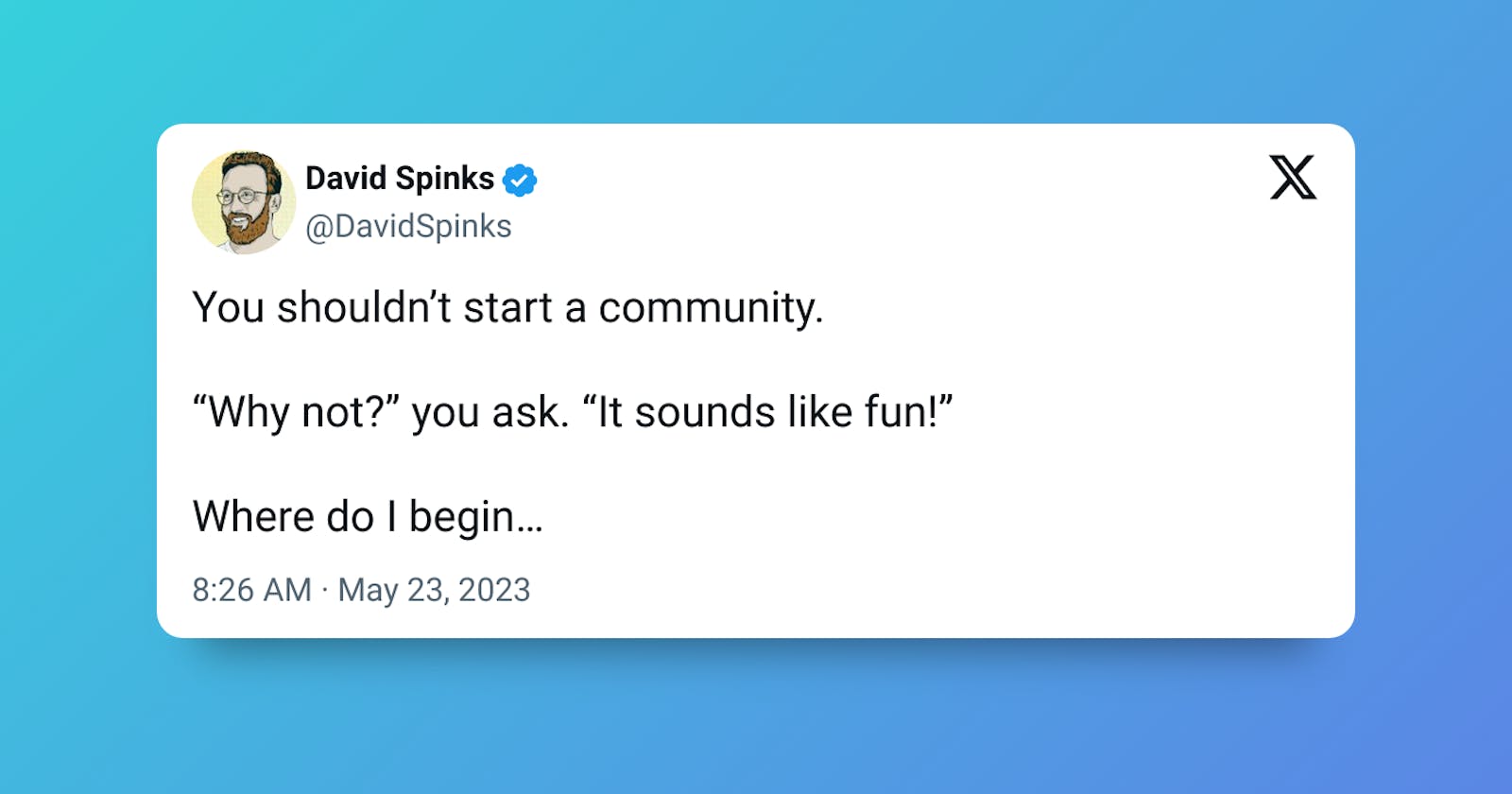While I don't Twitter, I recently saw a thread on LinkedIn from David Spinks about, why you shouldn't start a community—it's a must-read. At the same time, I'm glad I didn't read this two years ago because I may never have gone down this road, I wouldn't have learned everything I did in my trial-by-fire experience, and I wouldn't have found out just how much I love it.
I wanted to share my thoughts and experiences based on what David had to say. I only share the primary question he poses here and, again, I strongly suggest that you go and read everything he has to say in his thread. With that said, here are my thoughts and experiences on most of the points he shared.
It will take 10x more [effort] than you expect.
I am a full-time program and people manager for my business and my team. I also wear the hat of the community manager for my team. It is verifiably exhausting, and most days feel like a straight vertical battle. As in other places, you'll be when you know it will be hard, be sure to have a support system in place.
Not only that but not one single initiative that I pursued was what I thought it would be in terms of effort. I once heard the phrase, "In theory, practice and theory are the same. In practice, they're very different." and that was true for me, here. The ideas I had on paper were much more difficult during implementation, and there were always residual effects that I had not considered, that couldn't be ignored.
Your community never sleeps!
We started building our community before we had any experience doing so, all we knew was that our users weren't happy with what they currently had and they were yearning for more. Within a few months, we were being asked by our business leaders, those in the field of our business, and our customers/partners, "Are you going to bring your team into the EMEA/et. al. time zone?".
Are you the type that needs a lot of clarity that you’re succeeding?
In my limited but growing experience, this question is spot on and is going to depend a great deal on your personality. When I first met my boss, I told him that he would probably spend more time slowing me down or reeling me back in a bit than having to push me forward. I spent a lot of time going out and doing things without permission, but things I truly thought were right for our users and good for the business.
I didn't have many leading or trailing indicators of what success looked like. Thankfully, I had the trust and belief of my organization's leadership for our team to focus on doing what was right, and figuring out the metrics afterward.
This has, so far, proven to be a good trait to have when building and growing a community.
You'll never know exactly how community impacts your business.
This is mostly true. I think what David is getting at is that it will be almost impossible to tie your community efforts 1:1 directly to dollars made or dollars saved. If so, I would be inclined to agree with this.
I would love to add to this though and say that you can know how community impacts your business, at least as defined by your business leaders. You should be *over-*communicating with your leadership chain for your org, and even executive leaders for other functions. Great business leaders will understand the value of community and that they will never see a 1:1 relationship to dollars, but they should have an understanding of what community is and what it means to their area of business, stakeholders, and customers. In this regard, you can know how it impacts your business as it pertains to your executive leadership team.
If you're reading this, I would strongly recommend you take David's Community MBA. It was immensely helpful in helping me to get started in the community space and to help me in at least attempting to answer this question.
You'll have two bad options for community platforms.
You'll have to read the full tweet for this one, but I think this is highly dependent on the context. In my case, we are building an enterprise community, in a specific industry, for a somewhat niche subject. I have not experienced this dichotomy of options in the slightest.
The only competition I've had is with myself and making sure I'm choosing the best platform based on my users' needs. This could still be the case if you had to compete against an existing community in your space that was well-established on a bigger platform, but we didn't run into that either.
Get ready for the never-ending cycle of content creation.
This is mostly true in my experience. The more success you have in building an active community, the activity of your users will be almost directly proportional to how much you can step back from generating content. This has been true for us with answering technical questions (the more they answer, the less we have to), writing blogs, etc. Our recently launched ambassador program at SailPoint has been a great driver of this inverse function for us.
I had the opportunity to attend DevRelCon Prague in 2022, and Karin Wolok did a great talk on Turning Users Into Advocates, at Scale. I would highly recommend listening to or watching her talk. Building our ambassador program at my current company has led to explosive growth in our community members contributing to each other, and thus has reduced the burden on my team so we can create better experiences for these users.
There will be times when you post to the community and get zero responses
I recently experienced this, and while reading this tweet I had my own revelation. We share announcements in our community and some go unanswered, and that's okay. We pay attention to who views them, and who has subscriptions set up to get notified of them, and we do our best to partner with other teams (like Customer Success), to ensure our customers know about them during onboarding and throughout their customer journey. I recently made a post about a new initiative we were going to start in our community.
I only gave it a few short weeks and it had no comments (neither did that new category in the community) and in an unusual-to-me knee-jerk reaction, I removed the announcement and associated category, feeling it was a dud. Lo and behold, a customer reached out a week later asking where that category and announcement was, because they were looking to start using it. Regardless of if that customer reached out though, I should have been understanding that not ever announcement, post, tool, doc, blog, etc. is going to be a hit—if everything was a hit, then nothing would be.
You’ll have to deal with PEOPLE every. single. day.
Take this one to heart. Think about a really bad day you've once had—would you still be able to, or be happy to, work with your community in a way that delights? Or could you recognize those days well enough to know when to take a break from your community? I'm very fortunate that community is something that makes me happy, so happy that it's something I lean into to relax from my primary job.
You don't have to be the perfect people person when working with community, but you do have to recognize any shortcomings you have in this area so you know how to mitigate them.
You'll have to make tough decisions
In my experience it wasn't tough decisions that affected my users, but tough decisions that affected other teams within my business. The most prominent example being that we already had a community where I'm currently employed, but the community was stagnant and unkempt and with no interest changing course. We made the decision to build a better community for our subset of users, and that turned out to be a great decision that is applauded...but it didn't start that way.
When we first made this tough decision, we had to explain for over a year on why we had this community that was separate until value of the good work came to fruition. Be sure that you really believe in the decisions that you're making them, and that you understand and can justify why you're making them. Over time, our work paid off and we no longer have to fight this distinction.
You'll be subjected to relentless scrutiny.
True for us but, again, the scrutiny came from internal individuals and teams—primarily from teams who didn't understand or who felt threatened by how these changes would affect their work (e.g. managers this would make redundant, or better documentation and free content for developers could mean less revenue for training). This is where I was happy to have executive support for our vision, and that we had the data to show our value. Over time, we garnered more and more support for our efforts and the scrutiny has lessened to something less invasive and more manageable.
...I'm skipping a few of David's tweets that I don't have much experience to comment on, and will end with one more.
You’ll be lonely.
This couldn't be more true. Sometimes it was as simple as being excited to show my team about some community platform plugins I found and my team having a general, "meh." response, to reading posts just like this and not having anyone to discuss it with. Thankfully this lead me to CMXHub and I was already a part of the DevRel Collective. Seek out others who are in your space and build a network of colleagues in the community industry.
Final Thoughts
Again, I would strongly recommend you read the full Tweet thread from David and subscribe to his newsletter.
Documenting my thoughts here is mostly to be helpful to my future self and my memory, but I do hope these thoughts help someone else like so many others have helped me.

